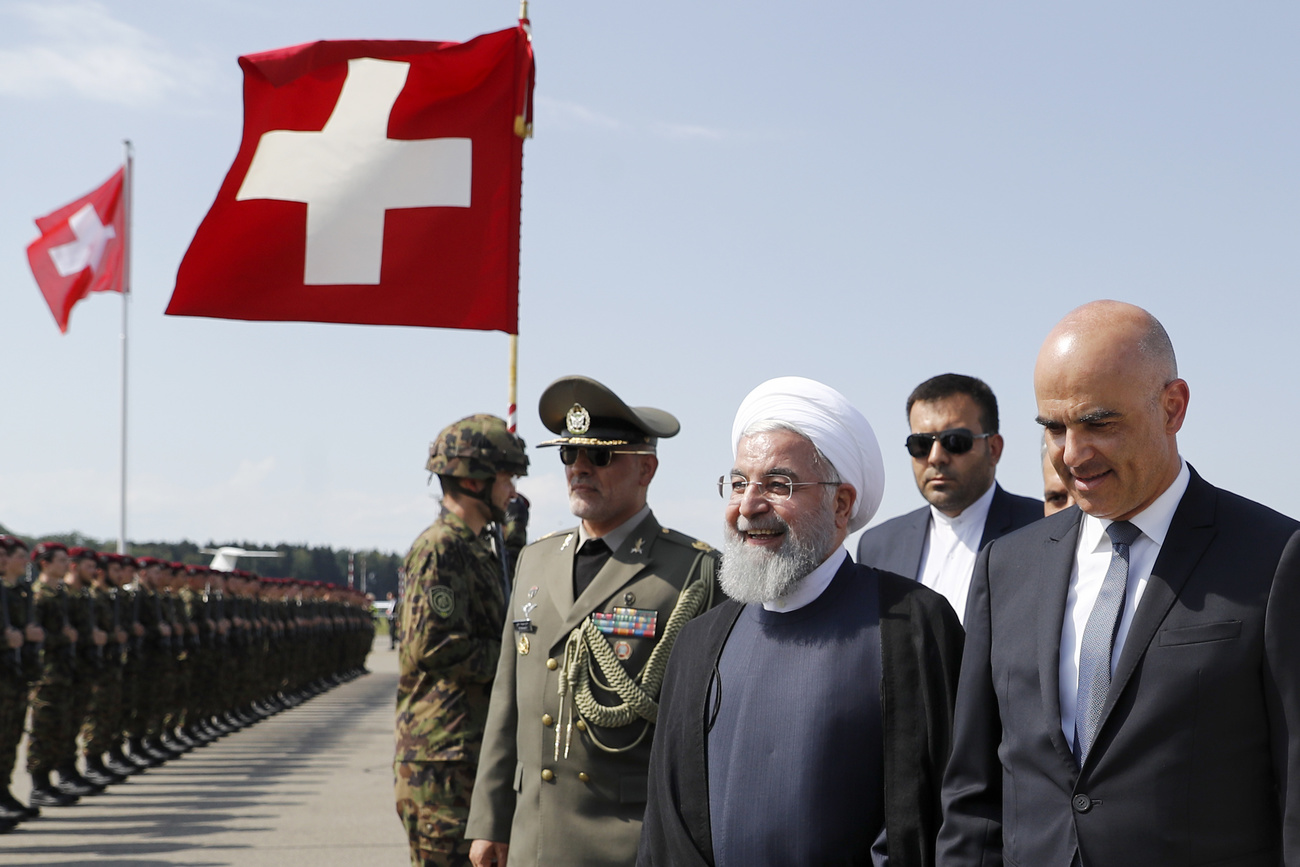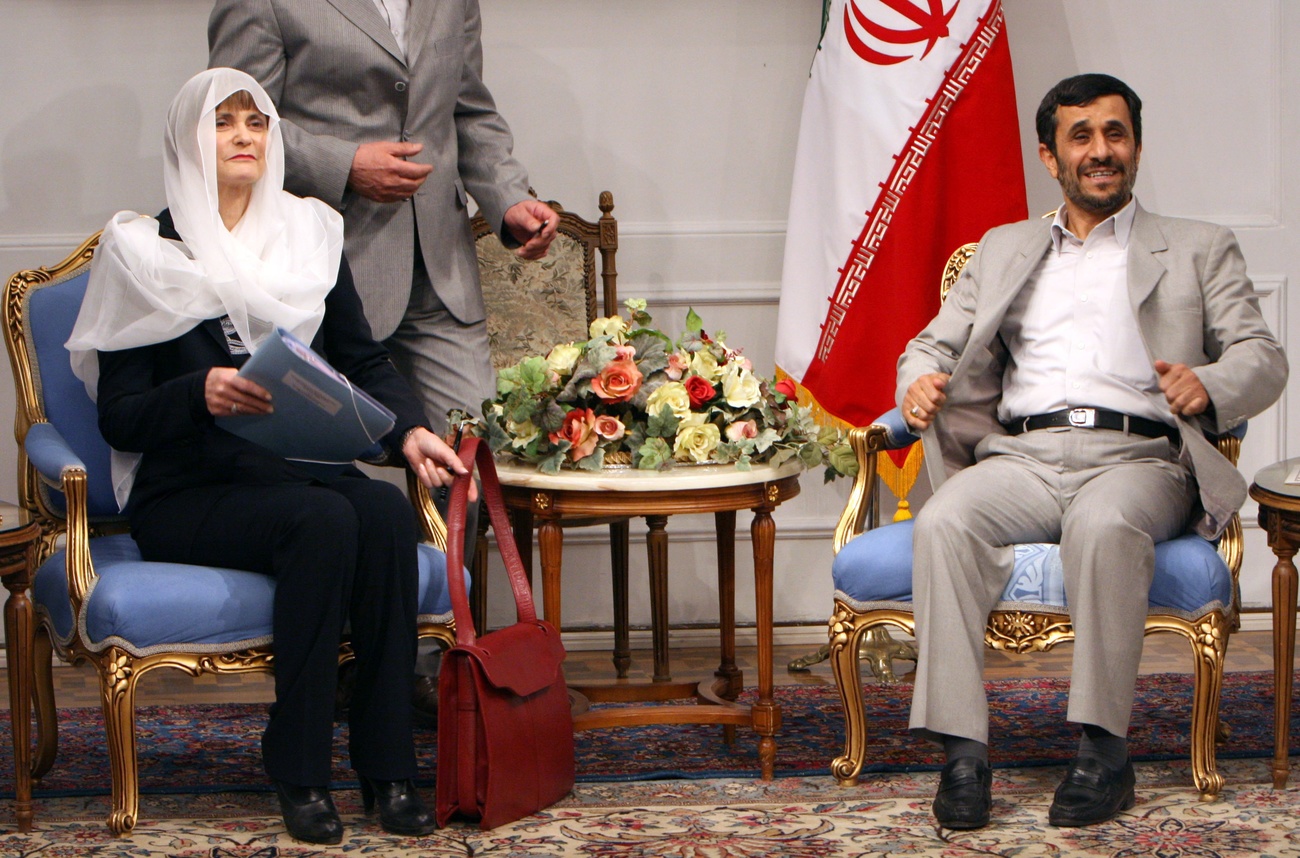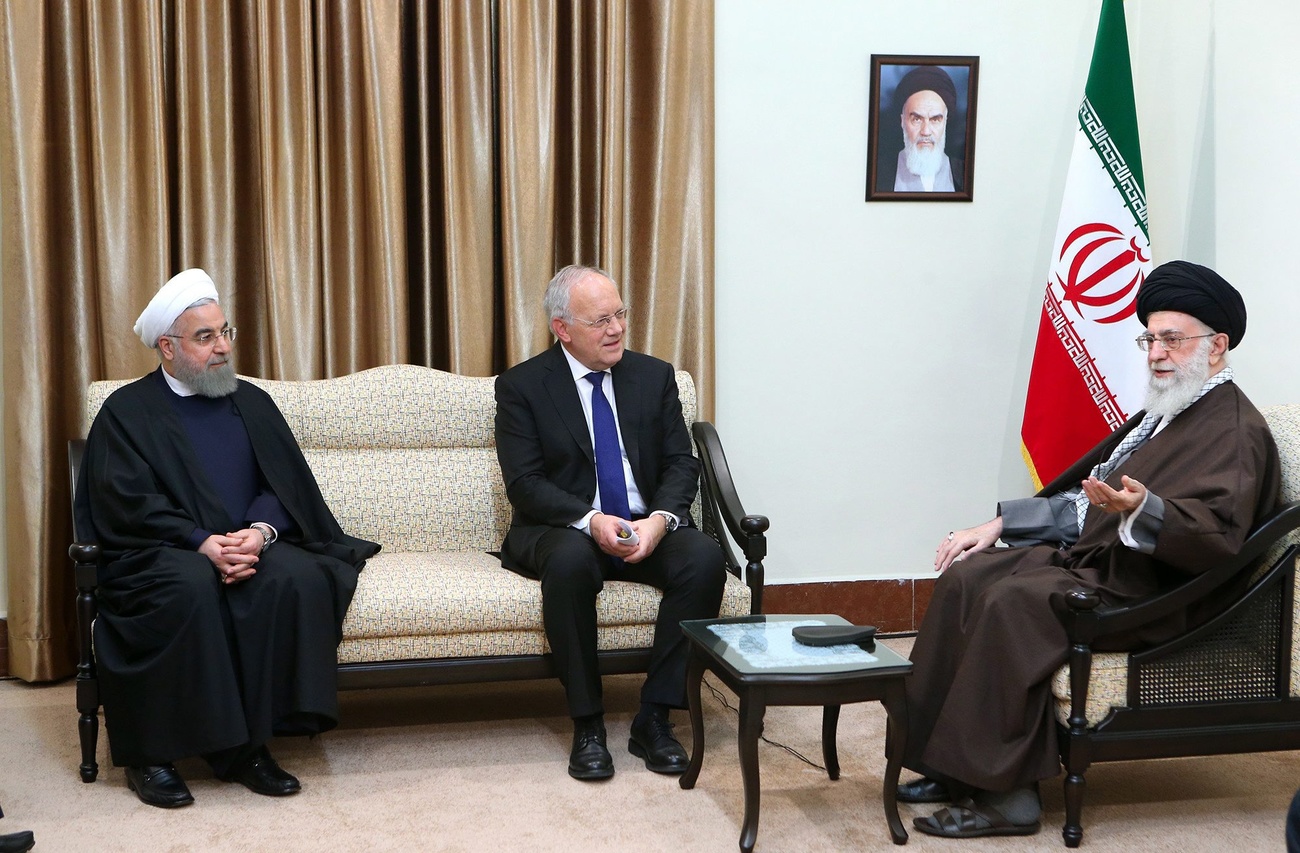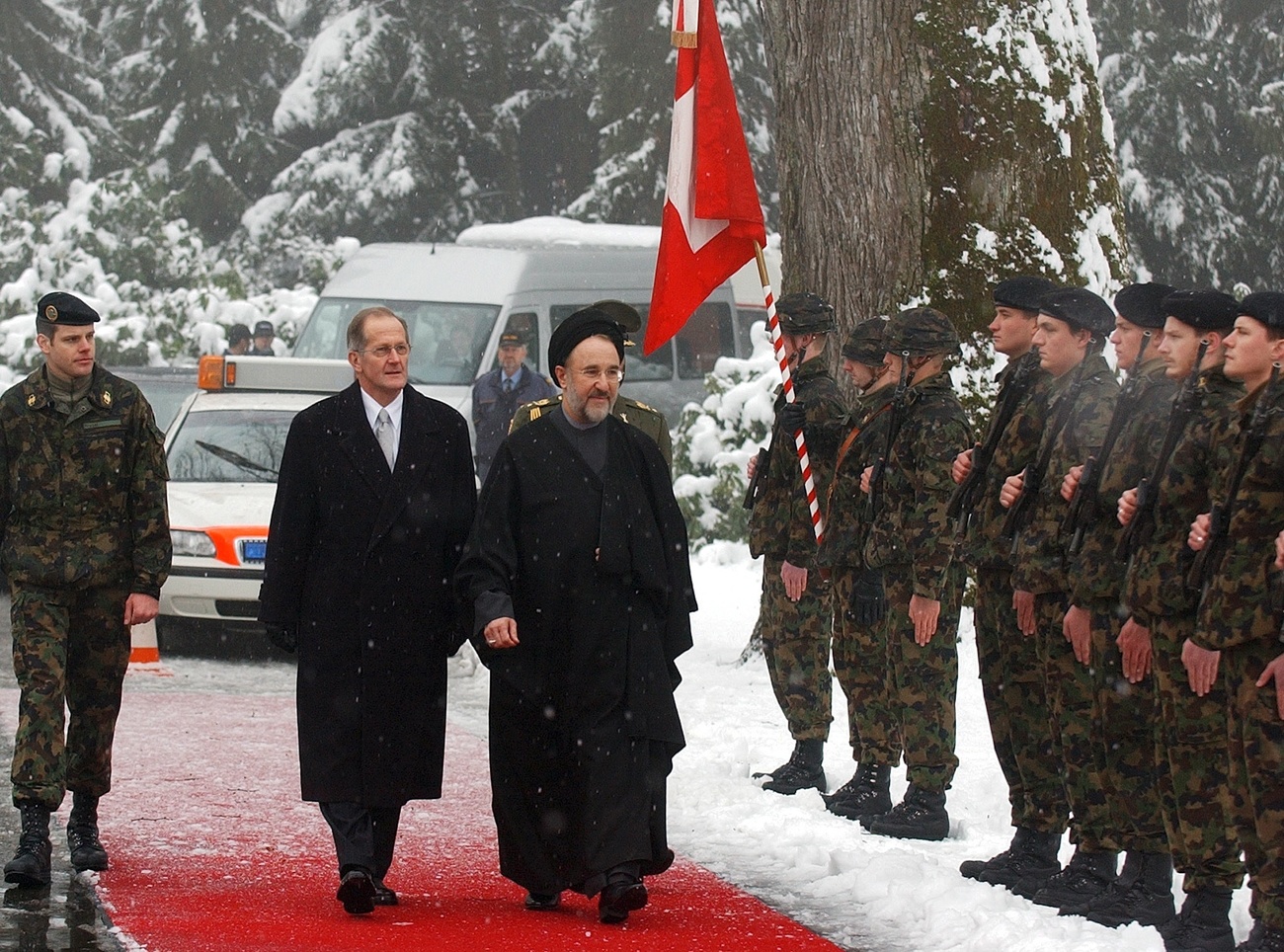
Iranian protests test Switzerland’s special status with Iran

Iran has been rocked by violent protests, and despite the government’s use of force against protesters, the people continue to fight. The latest revolt has brought Switzerland’s special role into focus.
Iranians have taken to the streets in 200 cities. Their rallying cry “Death to the dictator!” is reminiscent of 1979, when the same slogan brought about the downfall of the Shah. It is still uncertain, however, what impact these protests will have and whether they have the potential to overthrow the Iranian regime.
A change of power would be in Switzerland’s interest, says Kijan Espahangizi, historian at the University of Zurich. If the current regime were ousted, Switzerland would have “incredible opportunities” in Iran, he believes, as it would open up a market where Switzerland is already established.
Focus of my meeting with Iranian President Ebrahim Raisi: bilateral relations, Switzerland‘s protective power mandate & preserving the Iran nuclear deal #JCPOAExternal link. I also expressed my concerns over the death of #MahsaAminiExternal link & for the respect of #HumanRightsExternal link pic.twitter.com/CoRHqAYBfuExternal link
— Ignazio Cassis (@ignaziocassis) September 21, 2022External link
Iran has a lot to offer: 86 million well-educated people, the second-largest natural gas resources in the world and a treasury filled with oil money. When Switzerland negotiated treaty after treaty with the mullahs after the Shah was overthrown 43 years ago, there was hope that business with Iran would soon flourish. However, these hopes were shattered when the United States imposed sanctions on Iran in November 1979. The United Nations followed suit in 2006, and the European Union enforced its sanctions shortly after.
The former Swiss Ambassador to Tehran, Philippe Welti, who is now the president of the Economic Chamber Switzerland-Iran-ECSI, describes the current sanction cascade as a “dominant event” in the history of the relationship between the two countries.
Wave of brutality
But how did this special, close relationship between two very different countries come about? Switzerland is small and freedom-loving, while Iran does not respect any of Switzerland’s values of freedom, democracy and equality.
Iran wants to manufacture nuclear weapons. It wants to destroy Israel and intervenes in Iraq, Lebanon and Yemen. It has supported and fuelled dictator Bashar al Assad’s long bloody war in Syria which, according to the United Nations, has so far claimed 500,000 lives. Most recently, Iran has supplied Russia with drones, which prompted the EU to impose sanctions on the company that manufactures them. Switzerland adopted these sanctions at the beginning of this month.

At the same time, Iran has used brutal violence against its own people. Iran’s opposition reported that within 45 days more than 450 people were killed – 300 of whom have been confirmed – and more than 25,000 were arrested. Those people who are detained suffer torture, sexual violence and random treatment.
This new wave of brutality has prompted the EU to impose sanctions on officials of Iran’s morality police. Several Swiss politicians have also called for appropriate measures, but the only official statement was a tweet by the Swiss government.
#SwitzerlandExternal link’s statement on the protests in #IranExternal link pic.twitter.com/ZRCyItHtCRExternal link
— Swiss MFA (@SwissMFA) October 5, 2022External link
“I would be surprised if Switzerland did not speak up and support its values in the light of what is happening in Iran,” Welti says. However, it does so in direct talks with the authorities rather than in public, he says.
Two-pronged approach
Switzerland’s dealings with Iran have always followed a two-pronged approach: trade on the one hand, special diplomatic tasks on the other. The focus has always been on trade, but without its diplomatic efforts, the two countries would not have the close alliance they enjoy.
The more the Iranian regime manoeuvred itself into international isolation, the more important Switzerland became – not only for Tehran but also for other Western countries that had cut their ties with Iran. Switzerland was holding the fort, built bridges and took on the special role as a mediator between the West and Iran. This special role legitimised the friendship with the pariah state and protected Switzerland from being ostracised by other countries.

At home, it also served as a justification for its close ties with Iran. Just like with China or Russia, Switzerland wants to achieve “change through trade” in Iran. Whenever the Swiss criticise their government’s ties with Iran, the Swiss foreign ministry argues that a country can address human rights issues in, say, Iran only if it is represented there.
H.E. Mr. Ignazio Cassis @ignaziocassisExternal link, the honorable President of the Swiss Confederation, has sent a congratulatory letter on the occasion of the Iranian National Day, to H.E. Dr. Seyed Ebrahim Raisi, the honorable President of the Islamic Republic of Iran. #IRI43External link pic.twitter.com/AN0uSXGBuLExternal link
— IRANinSWITZERLAND (@IraninBern) February 11, 2022External link
In 1979 Switzerland was entrusted with its first protecting power mandate by representing Iranian interests in Egypt. In 1980 it was mandated to represent US interests in Iran which, according to diplomats, is the “crown jewel” of Swiss protecting power mandates. Since 2017 Switzerland has represented Iran’s interests in Saudi Arabia and vice versa, and in 2019 it signed a treaty to represent Iranian interests in Canada. Five of Switzerland’s seven protecting power mandates are with Iran.
Iran’s theocracy was firmly established after the Shah of Persia was overthrown in 1979. President Ebrahim Raisi, a hardline cleric, is subordinated to the Supreme Leader Ayatollah Ali Khamenei who has ruled for 33 years. The Islamic Council of Guardians which controls parliament is also under his rule.
A repressive apparatus ensures peace in the Islamic state. Until 2022, Iran’s revolutionary guards, the morality police as well as the public security and intelligence police were able to contain protests sparked by general discontent among the public.
Iran ranks 150th out of 180 on Transparency International’s corruption index. The country is also near the bottom of the Democracy Index, coming 154th out of 167.
During the Second World War, Switzerland held 200 such mandates, and it is important to uphold the remaining seven. “Switzerland has a great interest in not losing these protecting power mandates,” Welti says.
Neutral country
As a neutral country, Switzerland has acted as a mediator for states that have broken diplomatic ties with other countries due to conflicts. “There is no other country that has more experience in this matter than Switzerland,” says Welti, who was in charge of the US mandate during his time in Tehran. But how does Switzerland benefit? Protecting power mandates give Switzerland privileged access to world players and more clout on the international stage.
Iran also benefits from its close relationship with the well-respected Alpine country. It gives the mullahs more respect at the international level, and they don’t miss a chance to flaunt it.
Switzerland also helps Iran gain access to various organisations. At Iran’s request, for example, it has campaigned for granting it access to the World Trade Organization (WTO). Iran is rich in raw materials and has been desperately trying to tap into the world economy. Its currency has crashed, and inflation stands at 50%.
Switzerland’s readiness to support Iran’s accession to the WTO is laid down in a “roadmapExternal link for the enhancement of the bilateral relations” between the two countries which was signed in 2016 and comprises 13 paragraphs. The roadmap covers politics, economics, nuclear safety, environment, agriculture as well as legal matters.

Paragraph 10 addresses human rights issues, but it is vague. “The participants declare their intent to resume a dialogue on relevant human rights issues. The modalities holding this dialogue should be determined through consultations between the relevant officials of the participants.”
Switzerland is known to regularly raise issues with Iran such as women’s rights, freedom of expression and the death penalty, especially when young people are involved. Hundreds of citizens are executed in Iran every year, most by hanging, and many of those killings involve minors.
Special relationship
In 2018 US President Donald Trump took a tougher stance against Tehran. He wanted to bring the mullah regime to its knees and warned America’s trading partners that anyone who did business with Iran would not be doing business with the US. This threat was more effective than any sanctions. Not a single Swiss bank dared accept money from Iran, while most Swiss companies could not afford to spoil their relationship with the US.
Switzerland reacted by signing the Swiss Humanitarian Trade ArrangementExternal link (SHTA) with Iran, which allowed Swiss companies such as Nestlé, Novartis, Roche and Syngenta to send medicines and other vital goods to Iran despite US sanctions. However, it is not as easy as it sounds. For trade to go ahead, the companies in question have to submit their contract details to the US. Very few companies are willing to do this.
Switzerland does not seem to benefit much from its controversial engagement in Iran, while Iranian officials who want to travel to Geneva enjoy an uncomplicated visa process which is probably the greatest benefit that Iran derives from this special relationship.
“This is surely a concession which is very well received in Iran,” says Welti. “Geneva is very precious to Iran. It is a gateway to the world, just like oxygen.”
Adapted from German by Billi Bierling/ts

In compliance with the JTI standards
More: SWI swissinfo.ch certified by the Journalism Trust Initiative















![The four-metre-long painting "Sonntag der Bergbauern" [Sunday of the Mountain Farmers, 1923-24/26] had to be removed by a crane from the German Chancellery in Berlin for the exhibition in Bern.](https://www.swissinfo.ch/content/wp-content/uploads/sites/13/2025/12/01_Pressebild_KirchnerxKirchner.jpg?ver=f05a5a9c)















You can find an overview of ongoing debates with our journalists here . Please join us!
If you want to start a conversation about a topic raised in this article or want to report factual errors, email us at english@swissinfo.ch.